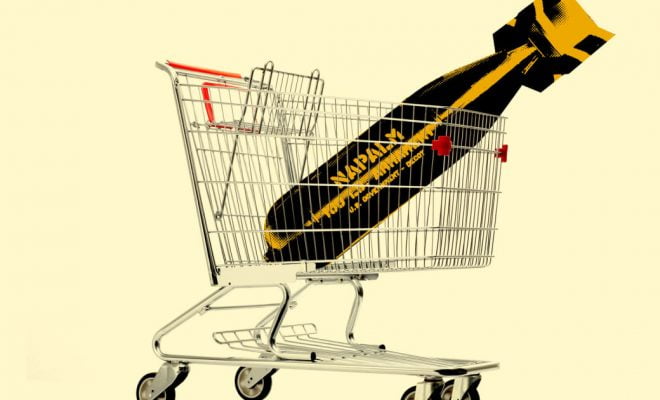Somebody Is Stocking Up On The Vietnam War’s Most Notorious Weapon

A troubled Arkansas arms company that sells specialty guns to the Central Intelligence Agency has been trying to purchase large quantities of napalm, the notorious incendiary weapon whose use is restricted by international treaty, BuzzFeed News has learned.
The company, Thor Global Defense, is a supplier of high-end firearms to the CIA’s paramilitary unit — the rapidly expanding Ground Branch of the Special Activities Center — and to other special operations forces of the US military, according to two sources familiar with the company and with CIA procurement operations.
Neither Thor’s efforts to acquire napalm nor its relationship to the CIA has been previously reported.
The firm’s offices were raided on May 2 by agents from Homeland Security Investigations, an arm of the Department of Homeland Security, and the Bureau of Alcohol, Tobacco, Firearms and Explosives. “I can confirm there is an ongoing federal investigation,” said HSI spokesman Bryan Cox but declined to provide further details. He referred questions about the investigation to the US attorney’s office for Western Arkansas, and a spokesman there declined to comment.
There is no indication that the raid had anything to do with napalm or the CIA, and it is unclear why Thor was raided.
The CIA declined to comment.
Thor declined to say who it was buying the napalm for.
A contracting document obtained by BuzzFeed News shows that Thor was trying to buy the weapon but does not say who it was for. Gretchen Davis, the Thor sales consultant who signed the document, confirmed the company has been trying to acquire napalm but also declined to name the customer. “I cannot discuss my clientele,” Davis said. “I’m bound by absolute confidentiality.”
She would not say if the CIA was the customer for the napalm.
Asked if the federal raid and investigation had anything to do with napalm, she responded, “No” but she declined to say what the focus of the investigation was. She said the company was represented by a lawyer, Graham Catlett. He did not reply to phone messages and emails.
Thor has never violated “any law or regulation of the United States,” the company said in a statement. Noting that Thor has “been in business for 13 years,” the statement, which made no reference to napalm, said the company is “proud to have fully complied with all US laws and regulations in its manufacture and sale of firearms.”
In addition to its work with the US government, Thor also acquires weapons for foreign governments, as an arms dealer registered with the Department of State. Davis declined to say whether the napalm was for a domestic or foreign customer. But she did say that the napalm is not for military purposes.
Napalm is the term for jellied gasoline; it sticks to and burns anything it touches — vehicles, buildings, clothes, human skin. Military experts said it is a weapon of terror, indiscriminate and inhumane, and they can’t envision the US or its allies using it in a current conflict.
Theoretically, they said, napalm could be used to burn out suspected terrorists hiding in caves or forests, or even to destroy poppy fields. But in 1980, with the introduction of the Convention on Certain Conventional Weapons, the use of incendiary weapons against concentrations of civilians was banned in most countries. The US Senate ratified the treaty in 2008 and President Barack Obama signed the protocol banning napalm on his first full day in office, in 2009.
In a 2017 letter seeking pricing for “Napalm Gel”, Thor writes, “THOR GDG will act as a purchaser and/or importer.” It said it was attempting to find a price and determine the “maximum monthly production.”
A source familiar with the effort says Thor pushed hard for months to find suppliers for the napalm.
Davis insisted that the napalm was legal to buy. “Hon, I deal in military products,” she said. “If a military needs napalm, I can place an order.” But she added that this napalm was not for military use: “It was for a legal application. It was not for war.”
She would not explain what the nonmilitary uses could be.
Read more…








